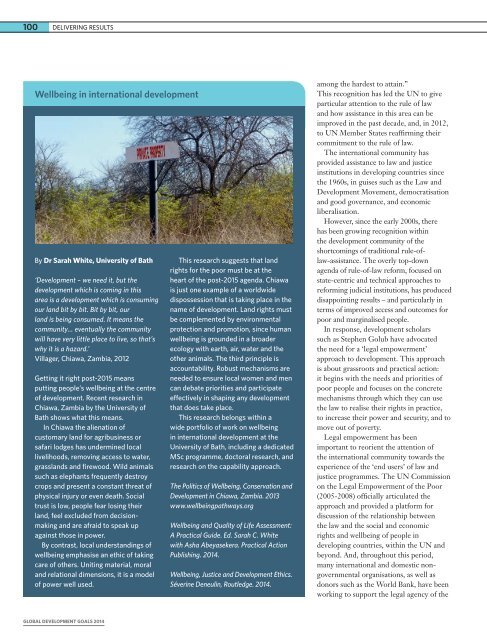FAMBB
FAMBB
FAMBB
You also want an ePaper? Increase the reach of your titles
YUMPU automatically turns print PDFs into web optimized ePapers that Google loves.
100 DELIVERING RESULTSWellbeing in international developmentBy Dr Sarah White, University of Bath‘Development – we need it, but thedevelopment which is coming in thisarea is a development which is consumingour land bit by bit. Bit by bit, ourland is being consumed. It means thecommunity… eventually the communitywill have very little place to live, so that’swhy it is a hazard.’Villager, Chiawa, Zambia, 2012Getting it right post-2015 meansputting people’s wellbeing at the centreof development. Recent research inChiawa, Zambia by the University ofBath shows what this means.In Chiawa the alienation ofcustomary land for agribusiness orsafari lodges has undermined locallivelihoods, removing access to water,grasslands and firewood. Wild animalssuch as elephants frequently destroycrops and present a constant threat ofphysical injury or even death. Socialtrust is low, people fear losing theirland, feel excluded from decisionmakingand are afraid to speak upagainst those in power.By contrast, local understandings ofwellbeing emphasise an ethic of takingcare of others. Uniting material, moraland relational dimensions, it is a modelof power well used.This research suggests that landrights for the poor must be at theheart of the post-2015 agenda. Chiawais just one example of a worldwidedispossession that is taking place in thename of development. Land rights mustbe complemented by environmentalprotection and promotion, since humanwellbeing is grounded in a broaderecology with earth, air, water and theother animals. The third principle isaccountability. Robust mechanisms areneeded to ensure local women and mencan debate priorities and participateeffectively in shaping any developmentthat does take place.This research belongs within awide portfolio of work on wellbeingin international development at theUniversity of Bath, including a dedicatedMSc programme, doctoral research, andresearch on the capability approach.The Politics of Wellbeing, Conservation andDevelopment in Chiawa, Zambia. 2013www.wellbeingpathways.orgWellbeing and Quality of Life Assessment:A Practical Guide. Ed. Sarah C. Whitewith Asha Abeyasekera. Practical ActionPublishing. 2014.Wellbeing, Justice and Development Ethics.Séverine Deneulin, Routledge. 2014.among the hardest to attain.”This recognition has led the UN to giveparticular attention to the rule of lawand how assistance in this area can beimproved in the past decade, and, in 2012,to UN Member States reaffirming theircommitment to the rule of law.The international community hasprovided assistance to law and justiceinstitutions in developing countries sincethe 1960s, in guises such as the Law andDevelopment Movement, democratisationand good governance, and economicliberalisation.However, since the early 2000s, therehas been growing recognition withinthe development community of theshortcomings of traditional rule-oflaw-assistance.The overly top-downagenda of rule-of-law reform, focused onstate-centric and technical approaches toreforming judicial institutions, has produceddisappointing results – and particularly interms of improved access and outcomes forpoor and marginalised people.In response, development scholarssuch as Stephen Golub have advocatedthe need for a ‘legal empowerment’approach to development. This approachis about grassroots and practical action:it begins with the needs and priorities ofpoor people and focuses on the concretemechanisms through which they can usethe law to realise their rights in practice,to increase their power and security, and tomove out of poverty.Legal empowerment has beenimportant to reorient the attention ofthe international community towards theexperience of the ‘end users’ of law andjustice programmes. The UN Commissionon the Legal Empowerment of the Poor(2005-2008) officially articulated theapproach and provided a platform fordiscussion of the relationship betweenthe law and the social and economicrights and wellbeing of people indeveloping countries, within the UN andbeyond. And, throughout this period,many international and domestic nongovernmentalorganisations, as well asdonors such as the World Bank, have beenworking to support the legal agency of theGLOBAL DEVELOPMENT GOALS 2014


